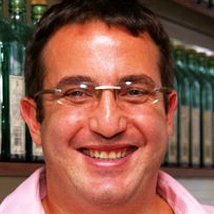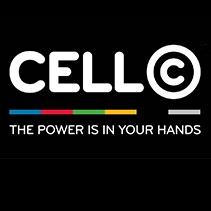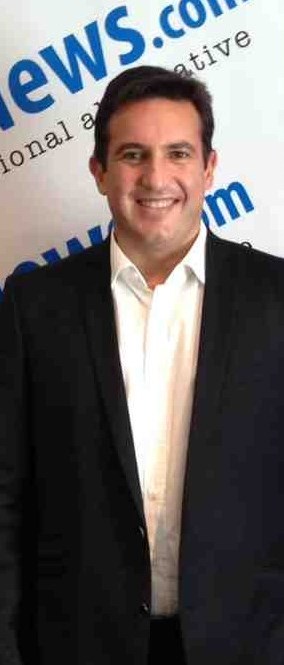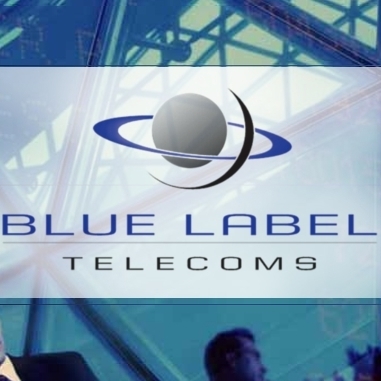
Lifestyle/Community

INTERVIEW: Business Day and Mark Levy
ANT KATZ with BDLIVE.co.za
Levy brothers’ big gamble
Blue Label Telecoms’ Mark and Brett Levy have come to the aid of debt-ridden mobile provider, Dubai-owned Cell C. While a number of potential suitors were chased away after they had a look at the books, Mark and Brett Levy seem to have come up with the ideal financing situation, including a listing.
Once listed, Blue Label will hold 35 percent, staff will hold 30 percent and Dubai-based Oger Telecom will reduce their holding from 75 to 27 percent – all without affecting the latter’s existing relationships with VodaCom and MTN.
LEVY BROS PARTNER WITH DUBAI’S OGER IN CELL-C
BUSINESS DAY TV: Blue Label Telecoms has sprung a fairly ambitious plan to buy a third of telecoms operator Cell C in a move that will see it recapitalise the firm and end up with a 35 percent share.
 Joining me now in the News Leader studio is the joint CEO of the company, Mark Levy. I suppose it’s quite a departure from your normal business, so what is the attraction of buying into an actual telecoms operator rather than a distributor which is the business that you’ve been in?
Joining me now in the News Leader studio is the joint CEO of the company, Mark Levy. I suppose it’s quite a departure from your normal business, so what is the attraction of buying into an actual telecoms operator rather than a distributor which is the business that you’ve been in?
MARK LEVY: I suppose you could look at it as somewhat of a departure but we look at it as a very strategic investment.
Blue Label has an investment philosophy and has been acquisitive by nature and we’ve been looking at different assets over time.
And with the recapitalisation of their balance sheet, with the great management that they have it made a great investment base case for Blue Label and we looked at it on that basis whether it stacked up, and it does.
BDTV: I know there are a few worries out there that you’re coming into a firm to recapitalise it so you’re not necessarily coming into a firm that is massively profitable that doesn’t have debt issues. What you’re doing is essentially helping to put it on an even keel and then it’s anyone’s guess as to whether or not it will take off from that point.
ML: Yes I’m not quite sure its guesswork now. One spends a lot of time understanding business models, stress-testing assumptions and with the recapitalisation of the balance sheet, the reduction of the debt to a real meaningful place between R6bn and R8bn to have enough cash flow to sustain it for years to come, I believe it’s a great investment opportunity. It has a great set of management and with their ideas and where they’ve taken the business over the last couple of years, it really stacks up for good shareholder return.
CLICK to read: Levy bros partner with Dubai’s Oger in Cell C
BDTV: So how does it fit into the existing business of Blue Label because you do talk about synergies that you had to have in distribution but perhaps you could explain it because it’s a little bit ephemeral I suppose at this stage.
 ML: One needs to be clear, Blue Label has a core business and an investment shouldn’t detract too much from its core business. We have significant…probably two decades worth of relationships with both Vodacom and MTN and long-term agreements and we have no intention of breaching or breaking those agreements. So for us it’s business as usual. Where I believe there will be opportunities is the ability for Blue Label to vertically integrate into a Cell C, the ability for us to supply the products that we have, services that we do, handsets or tablets that we bring into this country. So it’s not just a one-way directional…hang on, you’ve bought Cell C, stop everything. It’s not like that. Its business as usual for Blue Label. We have the ability to vertically integrate our service and products into their environment and that bodes well for a good relationship going forward.
ML: One needs to be clear, Blue Label has a core business and an investment shouldn’t detract too much from its core business. We have significant…probably two decades worth of relationships with both Vodacom and MTN and long-term agreements and we have no intention of breaching or breaking those agreements. So for us it’s business as usual. Where I believe there will be opportunities is the ability for Blue Label to vertically integrate into a Cell C, the ability for us to supply the products that we have, services that we do, handsets or tablets that we bring into this country. So it’s not just a one-way directional…hang on, you’ve bought Cell C, stop everything. It’s not like that. Its business as usual for Blue Label. We have the ability to vertically integrate our service and products into their environment and that bodes well for a good relationship going forward.
RIGHT: Mark Levy
BDTV: I know that people are worried about the effect this will have on your other existing relationships with essentially Cell C’s competitors…Vodacom and MTN.
ML: It is a question we’ve been posed a lot with and the way we look at it is globally Apple supplies Samsung, Samsung supplies Apple, there are patents and people share in those patents, so it’s something called “co-opetition”. We believe that there’s no reason why anyone should panic or anyone should change. We have great relationships with Vodacom and MTN, we have great contracts that we’re not going to break for any reason. So just because you have an investment strategy into a good asset, it doesn’t mean the rest of the business needs to fall over.
BDTV: You’re not going to break those contracts but have you had any feedback from them subsequent to announcing this?
ML: Not much…everyone is taking some time to digest it. There’s a lot of hearings that have been going on with the other deals that are pending in the market. So yes I’m sure on the face of it it looks traumatic but once people digest it, have a look at it, it’s not as bad as everyone makes it out…it’s actually a great investment opportunity. It’s a great opportunity to keep this asset localised instead of a foreigner coming in and buying this asset and potentially creating havoc in this market. It’s done with a partner that they’ve dealt with for many years. So if you slow down, take a couple of breaths, analyse who has bought it and who is doing what, it will bode well for everyone
BDTV: Panic is probably the word De Jure for the last couple of days. But what about the funding of it, tell us about the recapitalisation and how you’re going to fund that R4bn contribution that Blue Label is going to be making into Cell C.
ML: Blue Label has always been a cash positive and cash generative business. We sit with an excess of R2.5bn worth of cash and stock on our balance sheet so we will use a lot of our own resources and we’ve arranged long-term borrowings from a bank. So we’ll do it between our own cash resources and some borrowing.
BDTV: Having seen what’s happened to bond rates over the last 48 hours, is this going to affect you or have you actually secured that…
ML: Not at all. We’ve already secured our financing and we have our own cash so it shouldn’t be a problem. Those are bigger macro problems for this country than this deal per se. We’re not looking to IPO (initial public offering) it now in a tough time, we’re not looking to issue bonds and that could probably have created a lot more pressure.
BDTV: Okay, so the resultant structure will be 35% owned by Blue Label, 35% by 3C Telecommunications and then 30% by Cell C staff and management. Are these parties that you’re comfortable and happy to work with?
ML: Oger Telecoms have been the main shareholder since inception so they’ve been phenomenal partners to Cell C and then writing down the debt in order to substantiate this deal and show their commitment to making it happen is phenomenal…Blue Label is and for us the kudos to Oger to incentivise management and staff, this is probably one of the largest staff incentive BEE transactions where 30% of your company is going to staff and BEE. That is an amazing opportunity in this country. Very few big corporations will do that for their staff.
ML: It’s a good question and it’s not going to have such a good answer…but these things don’t happen overnight. It takes a lot of effort and time and understanding and pushing and prodding to see where businesses go. With the debt structures maybe historically when Telkom was looking at it, it wasn’t really attractive to us at all. But with the restructure and what Oger and management bought into was the ability to reduce the debt and take a bigger loss now and potentially reap the rewards in the future.
So these things take time … it could have gone either way if they had accepted that offer or not. But I think they’ve bought into a restructured group with decent partners that could add value to all shareholders.
BDTV: So you’re saying that you were actually looking at them as or when Telkom was looking at them, or even before
ML: Sure.
READ THIS TRANSCRIPT ON Bdlive.co.za
 BDTV: Okay, one of the things for telecom companies is having the capital to be able to go out and invest in the network. So even though you are restructuring the debt and bringing it down, will it have enough free capital to go out and do what it needs to and that is one of Cell C’s problems I guess has been not having as good a network as the other two.
BDTV: Okay, one of the things for telecom companies is having the capital to be able to go out and invest in the network. So even though you are restructuring the debt and bringing it down, will it have enough free capital to go out and do what it needs to and that is one of Cell C’s problems I guess has been not having as good a network as the other two.
ML: Sure…that is critical. Its critical two elements were that the debt was restructured, specifically into a rand based debt and ensuring that whoever put in money had sufficient cash flow to ensure that they could do what they needed to do for the coming years. So based on those two things it made sense. So unless you could say, do you have enough money to…here’s your business plan for the next five years and can it service the debt and do whatever. Unless those two things stacked up we would have found it very difficult to do a deal.




